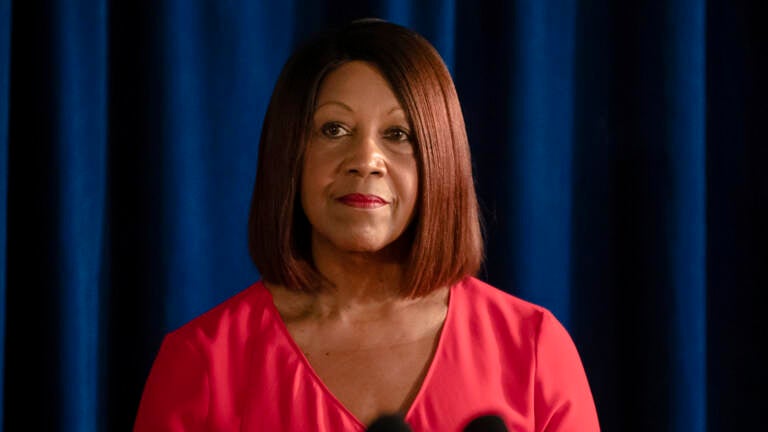As Assembly speaker, Sheila Oliver helped Steve Sweeney become Senate president
A political turf war created an “odd couple situation” between the South Jersey conservative and Essex County liberal, but they got things done for the state.

File: Lt. Gov. Sheila Oliver during a bill signing ceremony at the state capital in Trenton, N.J., Monday, Aug. 5, 2019. (AP Photo/Matt Rourke)
As New Jerseyans prepare to say their final goodbyes to Lt. Gov. Sheila Oliver, political pundits and colleagues reminisce about her meteoric rise in the state’s political scene.
One of her legacies is how her rise to speakership paved the way for a little known South Jersey state senator to become Senate president.
“There is no Senate President Steve Sweeney without Sheila Oliver becoming speaker,” said Micah Rasmussen, director of the Rebovich Institute for New Jersey Politics at Rider University.
Explaining that New Jersey politics is “all about county power centers,” Rasmussen said a turf war emerged in 2009 when Camden County Democrat Joe Roberts decided to end a 22-year career in Trenton.
“Our state house power structure is very much revolved around which county gets what,” said Rasmussen. “If one side gets something, the other side is immediately on the phone, [asking] where’s mine?”
The battle for leadership was between the delegations of Essex County, Hudson County, and South Jersey.
Rasmussen explained that South Jersey Democrats opted to go for the Senate presidency, which would push Richard Codey, an Essex County Democrat, out of the position. Codey also served as governor during his tenure following the resignation of Jim McGreevey.
Sweeney had just served one session as majority leader of the upper chamber. Rasmussen noted that he ”hadn’t paid his dues” when he decided to challenge Codey.
“You can do that if you don’t also have the speaker’s chair at the same time,” Rasmussen said, adding that South Jersey Democrats needed to forgo the speakership in the lower chamber.
Oliver was ‘unifying choice’ in power sharing agreement
Sheila Oliver was a “popular, well-liked” choice for Assembly speaker, according to Rassmussen. But, he adds, it was very much an “odd couple situation.”
“It was an unusual combination, but it was an effective one,” he said of the pairing that lasted four years. “They worked candidly, pretty closely with Governor [Chris] Christie during that period of time. They both went along with the pension reforms that got them in some hot water.”
While Sweeney was on board to do whatever needed to get done on the reforms — sometimes referred to as Chapter 78 — it was Oliver who held the line based on fairness, according to Bill Caruso, executive director of the Assembly Majority Office during Oliver’s tenure as speaker.
“She fought at the end for workers’ rights that were enshrined in that law to help soften some of the blow of those increases on the House side, but she also fought for a sunset,” he said. “Her view is if this law is so great, we’ll come back and re-up it. But we’re going to restore the rights of collective bargaining. We’re not going to allow this to stand in perpetuity.”
Caruso added that Oliver also held firm on not cutting welfare or general assistance.
“Normally, you see leaders fighting for a project for their district or some political trophy of some sorts,” Caruso said. “What she did instead was she fought for the poorest of the poor in the middle of a recession and held the line. [She] never really got a lot of credit for that.”
Oliver’s ‘superpower’ was crossing the partisan divide
Caruso said Oliver was a great partner who held strong when needed but also worked behind the scenes, crossing the aisle to get things done.
He later learned that she would have regular secret meetings with the late Alex DeCroce, who was Assembly minority leader.
“It helped her work that caucus on the Republican side and work on getting agendas accomplished there by just having a dialogue regularly with her counterpart in leadership,” he said. “Nobody coached that. Nobody asked her to do that.”
Rasmussen said working with the other side was one of Oliver’s “superpowers.”
“She was someone who appreciated that old skill of being able to reach across the partisan divide,” he said, adding it’s an important skill, especially when counting votes.
“If you are a master of the [legislative] process, then you know how many votes there are on the other side and how many are against you so that you figure out how many votes you need to produce on your side,” Rasmussen added.
Oliver, the first Black woman to lead the Assembly as speaker and to serve as the second-in-command of the Garden State, died Aug. 1 at age 71. Her funeral is 10 a.m. Saturday at the Cathedral Basilica of the Sacred Heart in Newark.

Get daily updates from WHYY News!
WHYY is your source for fact-based, in-depth journalism and information. As a nonprofit organization, we rely on financial support from readers like you. Please give today.







